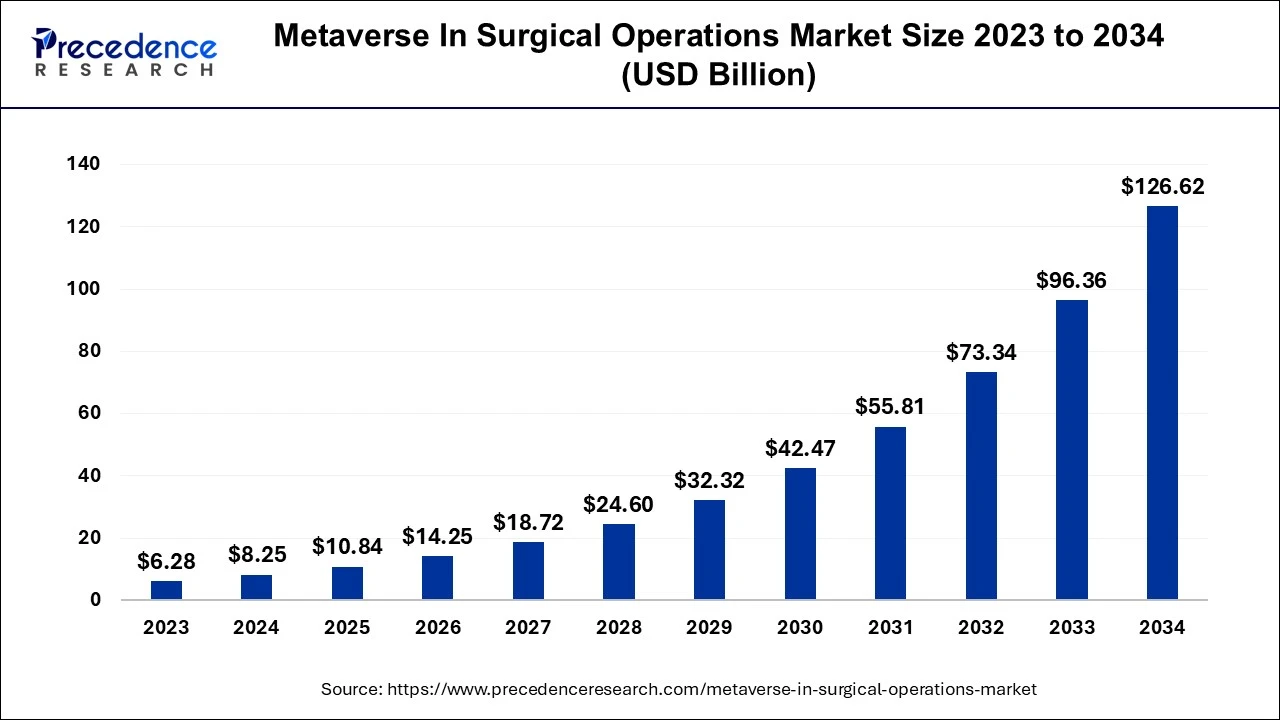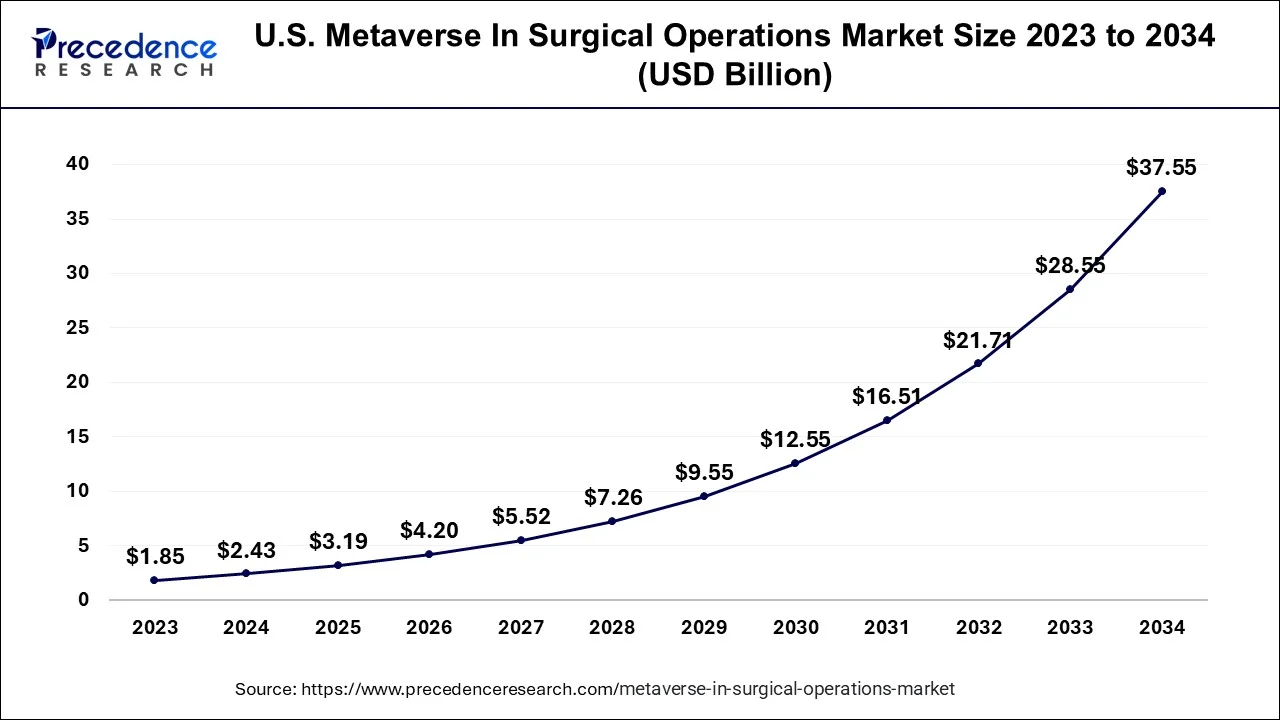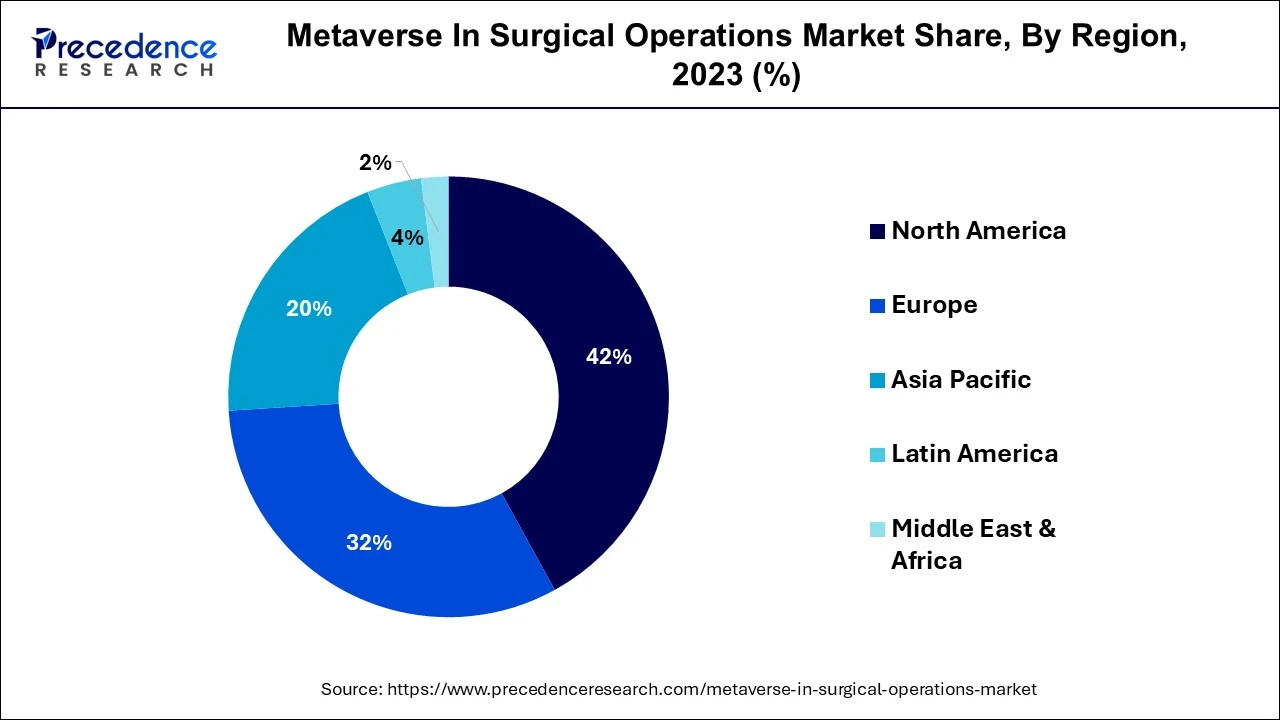What is the Metaverse In Surgical Operations Market Size?
The global metaverse in surgical operations market size accounted for USD 10.84 billion in 2025 and is predicted to increase from USD 14.25 billion in 2026 to approximately USD 152.05 billion by 2035, growing at a CAGR of 30.23% between 2026 to 2035.

Metaverse In Surgical Operations Market Key Takeaways
- North America contributed more than 42% of revenue share in 2025.
- Asia-Pacific is estimated to expand the fastest CAGR between 2026 to 2035.
- By component, the hardware segment has held the largest market share of 62% in 2025.
- By component, the software segment is anticipated to grow at a remarkable CAGR of 32.5% between 2026 to 2035.
- By application, the surgical training segment generated over 49% of revenue share in 2025.
- By application, the telesurgery segment is expected to expand at the fastest CAGR over the projected period.
- By technology, the Virtual Reality (VR) segment has held the largest market share of 52% in 2025.
- By technology, the Augmented Reality (AR) segment is expected to expand at the fastest CAGR over the projected period.
- By end-user, the hospitals and surgical centers segment had the largest market share of 49% in 2025.
- By end-user, the medical training institutes segment is expected to expand at the fastest CAGR over the projected period.
What is the Metaverse in Surgical Operations?
The metaverse in surgical operations market represents a cutting-edge integration of virtual reality (VR), augmented reality (AR), and mixed reality (MR) technologies into the field of surgery. It enables surgical training, telesurgery, and preoperative planning by creating immersive and interactive virtual environments.
Surgeons and medical professionals can practice and refine their skills in realistic simulations, perform surgeries remotely through telemedicine applications, and plan complex surgical procedures with precision. This innovative market has the potential to enhance surgical education, improve surgical outcomes, and extend medical expertise to remote locations, revolutionizing the way surgeries are conducted and taught.
Metaverse In Surgical Operations Market Growth Factors
- Surgeons can hone their skills in lifelike virtual environments, reducing the learning curve in actual surgeries.
- Remote surgeries are made feasible, with expert surgeons performing procedures from distant locations, expanding healthcare access.
- Preoperative planning becomes more accurate, reducing errors and improving patient outcomes.
- Telesurgery applications allow surgical procedures to be conducted across geographical distances.
- Educational institutions and healthcare facilities adopt metaverse solutions for surgical training.
- Expanding telesurgery capabilities for remote surgical procedures.
- Creating sophisticated tools for precise surgical planning.
- Collaborating with medical institutions to integrate metaverse technologies into their curricula.
- The market is bolstered by a growing emphasis on preparedness for global health crises, like pandemics, where remote surgical capabilities become invaluable.
- The focus on delivering better patient outcomes and experiences by leveraging metaverse technologies in surgical operations drives market expansion.
Market Outlook
- Industry Growth Overview:
The metaverse in the surgical operations market is experiencing significant growth, driven by metaverse is an emergent concept in surgery, with much interest in its highly immersive and interactive virtual environment. - Global Expansion:
The metaverse in the surgical operations market is experiencing significant global expansion as it tackles common challenges that surgical trainees face, provides a safe environment for trainees to hone their skills, and enhances access to mentorship and training. - Major investors:
Major investors in the use of the metaverse in surgical operations include large technology organizations, established healthcare device companies, and specialized venture capital organizations.
Market Scope
| Report Coverage | Details |
| Growth Rate from 2026 to 2035 | CAGR of 30.23% |
| Market Size in 2025 | USD 10.84 Billion |
| Market Size in 2026 | USD 14.25 Billion |
| Market Size by 2035 | USD 152.05 Billion |
| Largest Market | North America |
| Base Year | 2025 |
| Forecast Period | 2026 to 2035 |
| Segments Covered | Component, Application, Technology, End User, and Region |
| Regions Covered | North America, Europe, Asia-Pacific, Latin America, and Middle East & Africa |
Market Dynamics
Driver
Technological advancements and remote surgery capabilities
Technological advancements and the integration of remote surgery capabilities are driving a surge in the market demand for the metaverse in surgical operations. Augmented reality (AR), virtual reality (VR), and 3D visualization technologies have enabled the development of highly immersive and realistic surgical environments within the metaverse. Surgeons can now train, plan, and even perform surgeries in a virtual world that replicates the complexities of real-life procedures. This not only improves surgical skills but also enhances preparedness for complex cases, ultimately resulting in better patient outcomes.
Moreover, the inclusion of remote surgery capabilities is revolutionizing the healthcare landscape. Surgeons can now perform surgeries from a distance, making expertise accessible to underserved areas, disaster-stricken regions, and even outer space. The ability to conduct remote surgeries enhances patient access to medical care, especially in critical or emergencies, where immediate expert intervention is crucial.
Moreover, the ongoing and potential future global health crises, like pandemics, have highlighted the importance of metaverse technologies in ensuring resilient and responsive healthcare delivery. These advancements are propelling the metaverse in surgical operations to the forefront of the healthcare industry.
Restraint
Limited accessibility and data security concerns
Data security is a paramount concern in the metaverse for surgical operations. Given the sensitive nature of medical data and the potential consequences of breaches, ensuring robust data protection is critical. The integration of metaverse technologies introduces new points of vulnerability, from patient records to live surgical feeds. Safeguarding this data against cyber threats, ensuring compliance with healthcare regulations, and protecting patient privacy pose significant challenges. Any perceived or actual compromise in data security can undermine trust in metaverse solutions, hindering their widespread adoption in surgical operations. Addressing these concerns is essential to build confidence in the safety and privacy of patient data in the metaverse.
Moreover, one of the primary restraints in the metaverse for surgical operations market is the limited accessibility to advanced technology in many regions. While developed countries and urban centers may readily adopt these technologies, rural and underserved areas may lack the necessary infrastructure and resources. This discrepancy in accessibility not only limits the reach of metaverse surgical solutions but also exacerbates healthcare inequalities, as patients in remote areas may not benefit from expert virtual surgeries or consultations.
Opportunity
Enhanced medical training and remote surgical consultations
The market demand for the metaverse in surgical operations is significantly propelled by the surge in enhanced medical training and remote surgical consultations. Metaverse technologies offer an unprecedented platform for medical training and education. Surgeons, students, and healthcare professionals can immerse themselves in realistic surgical simulations, practicing complex procedures without any risk to patients. This advanced training approach significantly reduces the learning curve for medical professionals, enhances their skills, and fosters a new generation of highly competent surgeons.
Moreover, remote surgical consultations are revolutionizing the healthcare landscape. Metaverse solutions enable expert surgeons to provide real-time guidance and even perform surgeries from a distance, transcending geographical barriers. This is especially crucial in emergencies, where remote surgical capabilities can save lives. It also extends access to specialized medical expertise to underserved regions. Patients benefit from the expertise of renowned surgeons without the need for extensive travel, thereby ensuring timely and high-quality healthcare services. These factors, combined with the rising demand for telemedicine, are driving the adoption of metaverse technologies in surgical operations.
Segment Insights
Component Insights
According to the component, the hardware has held a 62% revenue share in 2023. This encompasses the physical equipment and devices used to access, interact with, and enable surgical operations within the metaverse. This includes VR headsets, haptic feedback devices, motion tracking sensors, and computing hardware. The trend in hardware revolves around enhancing user experience, improving the ergonomics and comfort of devices, and ensuring compatibility and interoperability with various software platforms. Additionally, the trend leans towards miniaturization, making hardware more portable and less cumbersome.
The software segment is anticipated to expand at a significant CAGR of 35.2% during the projected period. Software is the digital infrastructure that powers the metaverse in surgical operations. This includes the development of realistic surgical simulations, telemedicine platforms, AI-powered diagnostic and surgical planning tools, and secure communication and data-sharing software.
The trend in software centers on creating immersive, high-fidelity virtual environments for surgical training and consultations. It also involves the integration of artificial intelligence for advanced diagnostics and personalized treatment plans. Furthermore, security and privacy in software solutions are paramount, given the sensitive nature of medical data and procedures. The goal is to provide a seamless and secure metaverse experience for medical professionals and patients alike.
Application Insights
Based on the application, the surgical training segment held the largest market share of 49% in 2023. Metaverse technologies are redefining surgical training. They provide a dynamic and immersive environment where medical professionals can practice and refine their surgical skills. These virtual platforms offer realistic surgical simulations, enabling surgeons and students to gain hands-on experience in a risk-free setting. This trend is enhancing the competency of healthcare professionals and reducing the learning curve for complex surgical procedures.
On the other hand, the telesurgery segment is projected to grow at the fastest rate over the projected period. Telesurgery, enabled by the metaverse, is transforming the field of surgery. Surgeons can now perform procedures from remote locations using robotic surgical systems connected through the metaverse. This trend is particularly impactful in situations where expert surgical guidance is required urgently. It also extends surgical expertise to underserved regions, improving access to healthcare services. As connectivity and technology continue to advance, the use of metaverse in telesurgery is expected to increase, enhancing the reach and efficiency of surgical operations.
Technology Insights
In 2023, the hospitals segment had the highest market share of 52% on the basis of the end user. Augmented Reality and Virtual Reality are pivotal technologies in the metaverse in surgical operations market. VR immerses users in a completely virtual environment, replicating surgical scenarios. This technology is gaining traction for its realistic surgical simulations, which enable medical practitioners to practice complex procedures and enhance their skills.
The ambulatory surgical centers segment is anticipated to expand at the fastest rate over the projected period. Ambulatory Surgical Centers (ASCs) within the metaverse denote virtual environments where surgical operations are simulated and conducted. These digital spaces leverage advanced technologies such as augmented reality and virtual reality to recreate realistic surgical scenarios. Surgeons can practice and refine their skills in a risk-free, immersive setting, fostering innovation and continuous improvement in surgical techniques.
The metaverse's integration into surgical operations introduces groundbreaking trends, enabling collaborative surgeries, real-time consultations, and data-driven insights. Surgeons can engage in cross-disciplinary collaboration and leverage artificial intelligence for enhanced decision-making. This convergence of technology and healthcare promises to redefine surgical training and procedures, pushing the boundaries of what is possible in the metaverse-enabled surgical landscape.
End Users Insights
The hospitals and surgical centers segment had the highest market share of 49% in 2023. In the metaverse in the surgical operations market, hospitals and surgical centers are significant end users. They are increasingly integrating metaverse technologies into their operations to enhance surgical procedures and improve patient outcomes. This trend involves utilizing immersive simulations, augmented reality, and virtual reality to provide surgeons with precise surgical planning and execution tools. This not only contributes to better patient care but also reduces surgical risks and complications.
The medical training institutes segment is anticipated to expand at the fastest rate over the projected period. Medical training institutes are pivotal in driving the adoption of metaverse technologies. These institutions are leveraging the metaverse to offer comprehensive and hands-on training to medical students and aspiring surgeons. The metaverse provides a dynamic platform for creating highly realistic surgical simulations, enabling students to practice and refine their skills in a risk-free virtual environment. The ability to offer practical training experiences through the metaverse is shaping the future of medical education and surgical skill development.
Regional Insights
What is the U.S Metaverse in Surgical Operations Market Size?
The U.S. metaverse in surgical operations market size was estimated at USD 3.19 billion in 2025 and is expected to be worth around USD 45.11 billion by 2035, growing at a CAGR of30.33% from 2026 to 2035.

North America: Presence of advanced healthcare infrastructure
North America has held the largest revenue share of 42% in 2023. In North America, the metaverse in surgical operations market is witnessing substantial growth driven by a convergence of factors. The region boasts advanced healthcare infrastructure and technological expertise, fostering a conducive environment for the adoption of metaverse solutions in surgical operations. Furthermore, the presence of leading technology companies and medical institutions accelerates innovation and collaboration.
U.S. Metaverse in Surgical Operations Market Trends
The presence of major tech companies that invest in advanced technology, such as Microsoft, has seen it spend over $20 billion in AR/VR and cloud-driven metaverse infrastructure. This spending supports Microsoft Mesh, Azure-based solutions, and novel forms of partnership, which drive the growth of the market.

Asia Pacific: Rising demand for remote surgical consultations
Asia-Pacific is estimated to observe the fastest expansion. The Asia-Pacific is experiencing a surge in metaverse applications in surgical operations. Rapidly developing countries like China and India are investing heavily in healthcare modernization, attracting significant investments from both local and international players. The demand for remote surgical consultations and advanced training methods is particularly high in this region, reflecting the evolving healthcare landscape and the quest for quality and accessible medical care.
China Metaverse in Surgical Operations Market Trends
China has been subjected to a growing incidence of cancer and various diseases, and the aging tends to be increasingly serious. China's increasing reality (XR) technologies within its digital economy policy framework. China has positioned XR, which includes augmented reality (AR), virtual reality (VR), and mixed reality (MR), in the nation's innovation for economic growth strategy.
Europe: Well-established healthcare systems
In Europe, the metaverse in surgical operations market is witnessing a progressive uptake of virtual andaugmented reality technologies for medical applications. The region's well-established healthcare systems and the pursuit of innovative solutions have led to the adoption of metaverse platforms for surgical training, telemedicine, and collaborative surgical procedures. With a focus on enhancing healthcare delivery and patient outcomes, Europe is fostering the integration of metaverse technologies into its surgical operations landscape.
The UK Metaverse in Surgical Operations Market Trends
The UK's medical care sector is increasing, with a projected 50,000 new positions predictable to be created in the forecast years. This growth is driven by a growing demand for advanced-quality healthcare services, driven by an ageing population and development in healthcare technology, which contributes to the growth of the market.
Metaverse in Surgical Operations Market Companies
|
Company |
Headquarters |
Key Strengths |
Latest Info (2025) |
|
United States |
Consistent innovation and R&D |
Intuitive Surgical Inc. has filed patents for modified animal tissues for simulated surgical procedures. |
|
|
Ireland |
Diverse and Innovative Product Portfolio |
Medtronic Plc (Medtronic), formerly Medtronic Inc., is a medical technology company that designs, develops, manufactures, and markets medical devices and solutions. |
|
|
Siemens Healthineers AG |
Germany |
Strong innovation and R&D focus |
Siemens Healthineers has developed an immersive virtual reality training program in partnership with PrecisionOS. |
|
Microsoft Corporation |
United States |
Robust ecosystem and continuous innovation |
Microsoft supports metaverse-based healthcare through HoloLens and Azure cloud platforms for immersive training and collaboration. |
|
Novartis International AG |
Switzerland |
Personalization and customization |
Novartis appears to be focusing on operational efficiency and strategic growth areas to navigate the challenges ahead. |
Other Major Key Players
- Koninklijke Philips N.V.
- Smith & Nephew Plc
- Immersion Corporation
- Hologic, Inc.
- CAE Healthcare
- VirtaMed AG
- Touch Surgery
- Osso VR
- FundamentalVR
Recent Developments
- In 2022, Ventyn entered thehealthcare metaverseby coordination with 8chili HintVR virtual reality platform. This integration empowers care coordination, utilizing machine intelligence, virtual training, patient engagement, education, and health coaching. The convergence of 3D content and digital health apps expands the possibilities of healthcare innovation.
- In 2022, GE Healthcare (US) partnered with MediviewXR (US) to co-create the OmnifyXR medical imaging system. This collaboration is dedicated to advancing medical imaging technology, potentially transforming how healthcare professionals interact with and utilize medical data for diagnosis and treatment.
Segments Covered in the Report
By Component
- Hardware
- Software
- Service
By Application
- Surgical Training
- Telesurgery
- Preoperative Planning
- Others
By Technology
- Virtual Reality (VR)
- Augmented Reality (AR)
- Mixed Reality (MR)
By End User
- Hospitals and Surgical Centers
- Medical Training Institutes
- Telemedicine Providers
By Geography
- North America
- Europe
- Asia-Pacific
- Latin America
- Middle East and Africa
For inquiries regarding discounts, bulk purchases, or customization requests, please contact us at sales@precedenceresearch.com
Frequently Asked Questions
Ask For Sample
No cookie-cutter, only authentic analysis – take the 1st step to become a Precedence Research client
 Get a Sample
Get a Sample
 Table Of Content
Table Of Content




 sales@precedenceresearch.com
sales@precedenceresearch.com
 +1 804-441-9344
+1 804-441-9344
 Schedule a Meeting
Schedule a Meeting